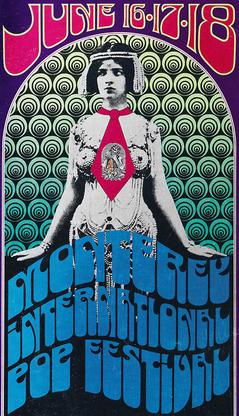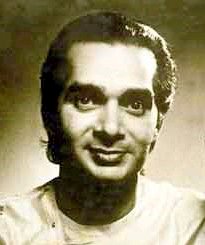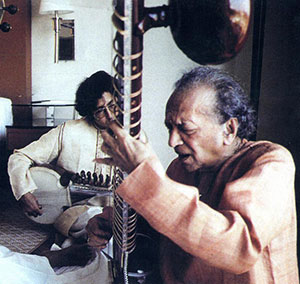
Ravi Shankar was an Indian sitarist and composer. A sitar virtuoso, he became the world's best-known expert of North Indian classical music in the second half of the 20th century, and influenced many musicians in India and throughout the world. Shankar was awarded India's highest civilian honour, the Bharat Ratna, in 1999.

The Monterey International Pop Festival was a three-day music festival held June 16 to 18, 1967, at the Monterey County Fairgrounds in Monterey, California. The festival is remembered for the first major American appearances by the Jimi Hendrix Experience, the Who and Ravi Shankar, the first large-scale public performance of Janis Joplin and the introduction of Otis Redding to a mass American audience.

Uday Shankar was an Indian dancer and choreographer, best known for creating a fusion style of dance, adapting European theatrical techniques to Indian classical dance, imbued with elements of Indian classical, folk, and tribal dance, which he later popularised in India, Europe, and the United States in the 1920s and 1930s. He was a pioneer of modern dance in India.

Nishat Khan is an Indian sitar player from an illustrious musical family and the foremost sitar virtuoso of his generation.

Raga is a 1971 documentary film about the life and music of Indian sitarist Ravi Shankar, produced and directed by Howard Worth. It includes scenes featuring Western musicians Yehudi Menuhin and George Harrison, as well as footage of Shankar returning to Maihar in central India, where as a young man he trained under the mentorship of Allauddin Khan. The film also features a portion of Shankar and tabla player Alla Rakha's acclaimed performance at the 1967 Monterey Pop Festival.
Jan Schmidt-Garre, German film director and producer.

David Acomba is a Canadian television and film producer/director whose television programmes have been featured on CBS, ABC, PBS, CBC, CTV, BBC, Channel 4, Showtime, and HBO.
Ravi Shankar had numerous solo recordings published, including these:

Harutyun Khachatryan is an Armenian film director, script writer, director of photography, film producer, General director of the Golden Apricot Yerevan International Film Festival, Meritorious Artist of the Republic of Armenia and voting Member of European Film Academy since 2006.

Alphan Eseli(Turkish: [Alphan Eşeli]); born March 7, 1973, is a Turkish film director, screenwriter, producer, and photographer. Eseli's critically acclaimed first feature film The Long Way Home (2013) has won the Fipresci Prize and the Golden Zenith Award at the 37th Montreal World Film Festival as well as the Best New Talent Award at the 7th Hong Kong Asian Film Festival.

Ravi Shankar's Music Festival from India was an Indian classical music revue led by sitarist and composer Ravi Shankar intended for Western concert audiences and performed in 1974. Its presentation was the first project undertaken by the Material World Charitable Foundation, set up the previous year by ex-Beatle George Harrison. Long a champion of Indian music, Harrison also produced an eponymous studio album by the Music Festival orchestra, which was released in 1976 on his Dark Horse record label. Both the CD format of the Ravi Shankar's Music Festival from India album and a DVD of their performance at the Royal Albert Hall in London were issued for the first time on the 2010 Shankar–Harrison box set Collaborations.

Chants of India is an album by Indian musician Ravi Shankar released in 1997 on Angel Records. Produced by his friend and sometime collaborator George Harrison, the album consists of Vedic and other Hindu sacred prayers set to music, marking a departure from Shankar's more familiar work in the field of Hindustani classical music. The lyrical themes of the recorded chants are peace and harmony among nature and all creatures. Sessions for the album took place in the Indian city of Madras and at Harrison's home in Henley-on-Thames, Oxfordshire, following his work on The Beatles' Anthology (1995). Anoushka Shankar, John Barham, Bikram Ghosh, Tarun Bhatacharaya and Ronu Majumdar are among the many musicians who contributed to the recording.
The Asian Music Circle was an organisation founded in London, England, in 1946, that promoted Indian and other Asian styles of music, dance and culture in the West. The AMC is credited with having facilitated the assimilation of the Indian subcontinent's artistic traditions into mainstream British culture. Founded by Indian writer and former political activist Ayana Angadi and his English wife, Patricia Fell-Clarke, a painter and later a novelist, the organisation was run from their family home in the north London suburb of Finchley.

Ravi Shankar: In Celebration is a compilation box set by Indian classical musician and composer Ravi Shankar, released in 1996 on Angel Records in conjunction with Dark Horse Records. The four discs cover Shankar's international career, from the 1950s to the mid 1990s, and include recordings originally released on the World Pacific, HMV, Angel, Apple, Dark Horse and Private Music record labels. Shankar's friend George Harrison compiled and co-produced the set, which was issued as part of year-long celebrations for Shankar's 75th birthday.
Viji Subramaniam, also known as Viji Shankar, was an Indian singer. She was the daughter of singer Lakshmi Shankar and Rajendra Shankar. Like her mother and uncle, Viji was a musician and trained in both the Indian classical systems.

Collaborations is a four-disc compilation box set by the Indian classical musician Ravi Shankar and the former Beatle George Harrison. Released in October 2010 on Dark Horse Records, it compiles two studio albums originally issued on that label – the long-unavailable Shankar Family & Friends (1974) and Ravi Shankar's Music Festival from India (1976) – and Chants of India, first issued on Angel Records in 1997. Although all three albums were originally Shankar releases, for which Harrison served in the role of music producer and guest musician, both Shankar and Harrison are credited as artists on the box set. Each of the collaborative projects represents a departure from Shankar's more typical work as a sitarist and performer of Hindustani classical ragas, with the box set showcasing his forays into, variously, jazz and rock, Indian folk and orchestral ensembles, and devotional music.

Live: Ravi Shankar at the Monterey International Pop Festival is a live album by Indian sitarist Ravi Shankar, released on the World Pacific record label in November 1967. It consists of part of Shankar's celebrated performance at the Monterey International Pop Festival in California on 18 June 1967. Shankar was accompanied throughout by his regular tabla player, Alla Rakha, who performs a frenetic five-minute solo on the recording.

Ravi Shankar's Festival from India is a double album by Indian musician and composer Ravi Shankar, released on World Pacific Records in December 1968. It contains studio recordings made by a large ensemble of performers, many of whom Shankar had brought to the United States from India. Among the musicians were Shivkumar Sharma, Jitendra Abhisheki, Palghat Raghu, Lakshmi Shankar, Aashish Khan and Alla Rakha. The project presented Indian classical music in an orchestral setting, so recalling Shankar's work as musical director of All India Radio in the years before he achieved international fame as a soloist during the 1960s.

The Kinnara School of Music was a music school founded in Mumbai, India, in 1962 by Indian classical musician Ravi Shankar. With his increased popularity and influence in the West, he opened a second branch of the school at 8718 West 3rd Street in Los Angeles in May 1967. Shankar's concept for Kinnara was to further the strict guru–shishya tradition of musical education that he had experienced under his teacher, Allauddin Khan, in the 1940s. The Mumbai centre staged productions of orchestral works by Shankar, including Nava Rasa Ranga.
The Juilliard Experiment: An Adventure with Music and Musicians is a 2016 British documentary film directed and produced by Mark Kidel. It follows French abstract painter Fabienne Verdier's experience during her semester at the Juilliard School as its first artist-in-residence in 2014. Verdier is shown developing work, reflecting on her process, and developing more paintings back at her studio in Le Vexin, France.















